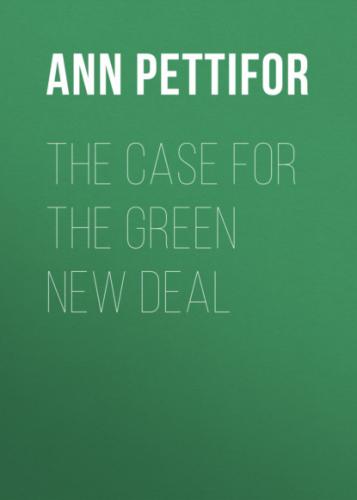The Case for the Green New Deal. Ann Pettifor
of the ecosystem, perhaps the most damaging aspect of globalised, largely deregulated credit-creation is the finance sector’s demand for high, real rates of return on a relatively effortless process: the creation of new money. If interest rates are higher than the capacity of the earth, or the economy, to renew itself, then interest rates become brutally extractive. People who are obliged by low or falling incomes to borrow are driven to work ever-longer hours to raise the money needed to repay the interest on their debt. Firms, too, cut costs and exploit labour more intensively in order to raise the finance needed to service their debts. Governments strip the forests, trawl the seas and exhaust the land to improve ‘efficiency’ and generate the returns needed to repay their obligations, including foreign debt service.
Bring Offshore Capital Onshore
It is my view – expanded in the next chapter – that to manage economic expansion, halt the impetus to capital accumulation and lower GHGs, it is essential to first manage the spigot of globalised credit creation. To that end, it will be necessary to bring offshore capital back onshore, and to subject the system to accountable management and regulation at the level of the state. Next, to manage the global crisis of earth systems breakdown we will need an international currency independent of the sovereign power of any single, imperial state. Finally, we will need to establish an international ‘clearing union’ for the settlement of credits and debits between nations as we go about sharing the burden of transformation.
Many will regard such proposals for radical global system change as utopian. And so they will be – until a global shock makes system change inevitable.
The plain fact is that societies have over time developed monetary systems that make the mobilisation of financial resources eminently possible for society’s urgent needs. Given the establishment of these systems, there need never be a shortage of money. But publicly backed monetary systems cannot be managed and deployed in the interests of society and the ecosystem as long as they remain ‘globalised’– captured and moved offshore, beyond the reach of regulatory democracy. In what is effectively the financial stratosphere, monetary systems serve the interests not of societies but of the global 1%. This has not happened by accident. As the result of a deliberate process, the financial system has been detached from the real economy of nation states and from governmental regulation. Following the logic of neoliberal economics, it has been ‘encased’ to protect the sector from democratic interference, as Quinn Slobodian shows in his book The Globalists. In other words, globalised, dollarized financial capitalism shifted offshore has undermined the power of democratic governments and local communities to develop economic policies to meet urgent needs.
We have been here before. Today’s globalised system harks back to the gold standard system of the 1930s when the private finance sector wrested control of publicly backed monetary systems away from democratic governments. At the time those that argued for ‘system change’ – the dismantling of the gold standard – were thought delusional. When the system did collapse, many economists were shaken to the core. Mistakenly, they had believed the gold standard was, like gold, immutable.
We Must Take Back Power
Given the vast power of dollarized globalisation over the world’s economies, can governments as rich as Germany’s or as poor as Mozambique’s mobilise the finance needed for the transition to a liveable planet? Could governments cooperate to mobilise the finance needed by the world’s poorest countries? We know there are ample financial resources (savings) to pay for the transition. But do societies and their governments have the power to realise these resources?
The straightforward answer is no. That fact presents Green New Dealers with the first grand mission: nothing less than global financial system change. If we are to support the campaigning efforts of Extinction Rebellion and the school strikes movement; if we are to fulfil the goal of a fundamental, system-wide transformation of the economy to save the ecosystem, then we must combine and cooperate at an international level to bring about a revolution in the power relations of the globalised and dollarized economic system.
As I explain below, cooperation and coordination between a progressive British economist and an American president and his administration brought about such transformation in 1933 and again, less successfully, at Bretton Woods in 1944. We can do so once more – equipped with sound economic theory and political practice to mobilise our collectively paralysed societies. The purpose will be to transform the globalised financial system within which the domestic economic systems of nation states are situated and integrated, and to which they are subordinated.
Given these challenges, and given today’s politics, the task of transforming the system may seem insurmountable. But, as David Roberts wrote in 2019: ‘We are not in an era of normal politics. There is no precedent for the climate crisis, its dangers or its opportunities. Above all, it calls for courage and fresh thinking.’12
Before we explore what must be done, we must first tell the correct story of how we got here. That is difficult because, as Rana Foroohar argues, ‘financialisation is the least studied and least explored reason behind our inability to create a shared prosperity.’13
So, how did the financial system globalise, and what can we learn from that?
Конец ознакомительного фрагмента.
Текст предоставлен ООО «ЛитРес».
Прочитайте эту книгу целиком, купив полную легальную версию на ЛитРес.
Безопасно оплатить книгу можно банковской картой Visa, MasterCard, Maestro, со счета мобильного телефона, с платежного терминала, в салоне МТС или Связной, через PayPal, WebMoney, Яндекс.Деньги, QIWI Кошелек, бонусными картами или другим удобным Вам способом.
